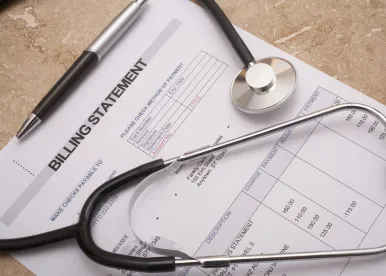Creditors know that when a debtor files bankruptcy, the "automatic stay" prohibits further collection activity to give a debtor breathing room to reorganize his affairs.
If a creditor willfully violates the stay, it can be held liable for actual and punitive damages, and attorneys' fees. Even an inadvertent stay violation can be considered "willful." And blaming your computer billing software is no defense, as one medical practice learned the hard way.
James Defeo Jr. filed Chapter 13 in South Carolina. One month into his case, he received an invoice from Winyah Surgical Specialists for an unpaid medical bill. Defeo had not notified Winyah of the bankruptcy and Winyah was unaware of it. Defeo's bankruptcy lawyer informed Winyah and added them to the case.
Winyah ticked certain boxes in their electronic records system to halt delivery of further invoices. Through human or computer error, the boxes didn't stay ticked and a second invoice went to Defeo after confirmation of his Chapter 13 plan.
This time, instead of a phone call, Defeo's counsel sued Winyah, seeking over $50,000 in damages, attorneys' fees, and punitive damages. Winyah immediately corrected the mistake, promised to halt all further notices, and sought to settle for Defoe's actual damages and legal fees.
Defeo's lawyer – who had a history of filing similar lawsuits with high-dollar damage claims – would not settle. Contentious litigation ensued. Winyah argued that it committed no willful stay violation because the second invoice was sent through inadvertence or computer error. The parties fought over production of documents. After 10 months, the case went to trial where Defeo testified that the second invoice caused him "stress, nausea, and loss of sleep" and that his lawyer had incurred over $17,500 in legal fees.
After trial, the Bankruptcy Court ruled for Defeo. The Court held that a creditor need not act with a specific intent to violate the automatic stay. An intentional act with knowledge of the automatic stay is a violation. The creditor's subjective intent is irrelevant. Winyah used a billing company that generated automated invoices from a shared computer server. To stop invoices from being sent, Winyah had to tick certain boxes on a patient's account. Because Winyah intentionally relied on the computer software to generate invoices, the automated conduct was deemed willful – even if it was inadvertent.
Saying "the computer did it" is no defense.
The good news for Winyah is that the Bankruptcy Court was unimpressed with Defeo and his lawyer for being unnecessarily litigious. The Court awarded no "emotional distress" damages or punitive damages, limited legal fees from $17,500 to just over $2,500, and added $16.76 for mileage. This was a "win" for Winyah until you factor in the legal fees they incurred fighting over the claim for 10 months. All because they failed to double-check that a few boxes were ticked.
The takeaway is that even if a creditor acts with a pure heart and good faith, the bankruptcy court can still hold them liable for unintentional errors or oversights. Creditors must establish procedures to avoid violations and diligently ensure they are followed. Creditors should also monitor the billing practices of their third-party billing companies, since they will be responsible for invoices sent on their behalf.
Finally, if you are accused of a stay violation, seek to redress it immediately. In limiting the damages award, the Bankruptcy Court pointed to how Winyah sought to resolve the issue early on, but was rebuffed (without good reason) by Defeo and his attorney.





 />i
/>i

